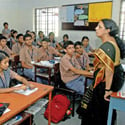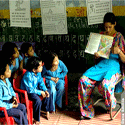Teacher has a very important role to play in inculcating good sanskars (subconscious impressions) in the minds of students. This task becomes easier if the teacher is spiritually inclined. However, the present educational system is based on Westernised ideas and thoughts.Considering this, a teacher has written an article about the ‘Present educational system and the duty of a teacher’, which is given ahead.
Both, the Students as well as the teacher benefitting by the Sattvikta (purity) in the Ashram (hermitage)
In ancient times, Gurukul educational system (A residential school system prevalent in ancient Bharat, where teaching in all areas of life, including spiritual practice was done by Gurus or Sages) was prevailing in Bharat. In that system, the Acharya / Guru (Teacher) was accountable for the comprehensive development of the students. Students used to reside in the Guru’s hermitage. Hence, they used to have a picture of their Guru as God (‘आचार्य देवो भव’). Since, the Guru himself used to practise Spirituality, he could instill similar sanskars in his students too. Besides this, the sattvik (sattva predominant; pure) atmosphere in the Ashram was beneficial to both,,the Acharya as well as the students.
Changes taking place in the educational system
1. Parents having confidence that their children will imbibe good sanskars : In the olden days, students used to have the ideal of simple living and high thinking because the teachers teaching them led a simple life. Their sattvik (sattva predominant; pure) behaviour and thinking was worth emulating for the students. So, the parents used to be certain that their children would imbibe good sanskars in school.
2. As the words like ‘Sanskar‘, ‘Dharmacharan’ (Observance of righteousness in daily life) are disappearing from the society, the society is deteriorating : As the influence of Western culture went on increasing in education, the attitude of the teachers too changed. When English medium schools came into existence, the teachers felt honoured when addressed as ’Sir’ or ‘Madam’. The students too were influenced by this changed attitude of their teachers. As the words, ‘Sanskar‘ and ‘Dharmacharan’ have started vanishing from the society, the society has started deteriorating.
Condition of students of other religions
The students of other religions are given education of their respective religion, apart from the standard academic education, in their schools. However, only Hindus have neglected this aspect and do not provide education about Hindu Dharma to their children.
Social condition
There are many causes of the failure to build a generation having good sanskars. Parents have no time for their children because of their jobs and busy schedule. Grandparents who could instill good sanskars on the children are not there at home because of the modern concept of nuclear family system. So, small children are kept in crèche and they while away their time viewing television. There is no one to guide them about what is good or bad.
Political situation
In ancient times, the kings used to be righteous; so they were ruling according to the guidance given by Sages who were under their patronage. However, present rulers are not Righteous, hence they are unable to preserve and strengthen the culture. As the education societies too are owned by these unrighteous rulers, we cannot expect them to impart good sanskars and values to our children.
Present educational system
A student is becoming psychologically ill in the present educational system. Instead of getting bliss while studying, students are constantly under tension. In addition to this, textbooks provided to the students are not based on reality. So, there is no chance at all of creating sanskars on the minds of students. In such a situation, if we wish to preserve Hindu culture, the teacher’s role is very important. If, in future, a teacher becomes a seeker then he can instill sanskars in children through teaching.
What exactly do we expect when we say that the teacher should become a seeker?
1. Finding out reason behind each incident in day to day life and provide a solution to it, that is, teaching spiritual practice : Students cannot get Bliss by merely giving them bookish knowledge according to syllabus. For that, apart from the academic education, students should also be taught to view everything from the spiritual viewpoint. The students should be taught to find out reason behind each and every incident taking place in daily life and provide a solution to it; thus teaching spiritual practice.
2. Dharmacharan (Observance of righteousness in daily life) and Spiritual practice :The teacher should himself follow Dharmacharan and should practice spirituality to set an example before his students. A teacher should have sufficient knowledge so as to explain spirituality to his students in a simple manner.
3. Studious attitude : The teacher should have a studious attitude and should be constantly desirous of learning the truth
4. Action : Not just giving advice in order to instill sanskars, but teaching through appropriate action.
Some plans for teaching Dharmacharan and sanskars to children
1. Books based on education about Dharma and sanskars must be included in the school library.
2. Class of value education to be conducted after school hours.
3. On the occasion of ‘parents’ meetings’, a discussion should be held with parents besides students’ progress, on subjects like sanskars, Dharmacharan and spiritual practice
4. Planning lectures/ guidance by religious persons, Saints, Seekers during the students’ assembly on occasions like Birth or Death anniversary of famous personalities, etc.
5. Telling assistant/ junior teachers about spiritual practice and seeking their cooperation in day to day projects
6. Events like cleaning temples, participating in religious functions to be organised.
If teachers undertake such things, then well-cultured students can be developed and society would benefit from it. In this way, a teacher can complete the task of spread of spirituality in society, thereby repaying the debt of the society and sages and thus be showered with God’s grace.
– Mrs. Vandana Karche (Teacher), Pimpri

 Responsibilities of Teachers !
Responsibilities of Teachers ! Stress free teaching for a cultured generation !
Stress free teaching for a cultured generation ! Teaching as a Spiritual practice
Teaching as a Spiritual practice Only teachers can develop a Cultured generation !
Only teachers can develop a Cultured generation ! Need to rekindle the self-confidence in Students
Need to rekindle the self-confidence in Students